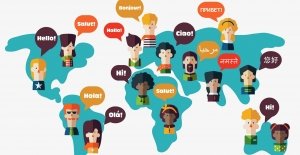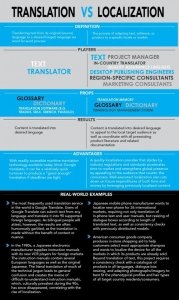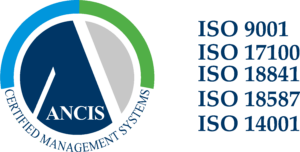What is Localisation? Conquer foreign markets with the right words
For a company intending to open its own line abroad, one of the simplest things to do is to develop a complete communications strategy for the destination country. From the creation of a website or e-commerce space to online and offline marketing activities. In fact, today, internationalising a business involves, first and foremost, brand exporting through differentiated strategic communications strategies.
Opening localised social channels in the destination country, advertising campaigns, web sites and e-commerce portals, press releases, public events. These are all important initiatives in communicating the values of your brand and building a relationship with the target market. Sharing your identity, the ability to communicate your values and convey emotion are key objectives in forging lasting connections with different national markets.
These goals can only be attained with the right messages using the right linguistic registers.
What is Localisation?
 Localisation is the process of adapting the content from an existing communication channel to be published in an external market. If, for example, an Italian company wants to sell its products in Germany, it will need to create a website with content adapted in the local language, open social channels in German or regularly publish German language content for the German market. The same goes for advertising, public events and all online or offline marketing activities.
Localisation is the process of adapting the content from an existing communication channel to be published in an external market. If, for example, an Italian company wants to sell its products in Germany, it will need to create a website with content adapted in the local language, open social channels in German or regularly publish German language content for the German market. The same goes for advertising, public events and all online or offline marketing activities.
While the term may seem to refer to the translation of content from a source language to a target language, the truth is that localisation is more than that. In fact, translation and localisation are often thought of as synonyms. However, localisation is a much more complex process than simply translating a text. Localisation also involves the general adaptation of the text, which in some cases is is limited to converting currency, time, units of measure and data formats. But very often, it requires a deep understanding of the culture of the target audience.
How important is localisation for a company that wants to sell on the global market?
According to Internet World Stats, of the more than 4 billion daily internet users, only 25% speak English, and more than half of all Google searches are performed in a language other than English. When we look deeper into user behaviour, we discover that, in every aspect, language affiliation is essential to the value of the product sold.
According to a European Commission survey (click here to download), 90% of Europeans never search in a language other than their own. Additionally, 42% won’t buy a product if the description is not in their own language.
Common Sense Advisory found that, at the global level, 72% of customers are more likely to buy a product or service if the information is in their own language, while 56% say that finding brand information in their own language is even more important than price.
Localisation is serious business
Let’s start with an example which is both funny and tragic (for the company).
A few months ago, the global brand Coca Cola launched a new marketing campaign in New Zealand. Wanting to use the Māori language to create a trademark channel to attract users in the local language, the company posted a slogan at the top of all its beverage vending machines.
 In an attempt to combine Māori and English slang, the slogan was “KIA ORA, MATE!”. In the Māori language, kia ora is like saying “hello” in English, and everything is fine to that point. The problem was the choice to add “mate” (English slang for friend), in an attempt to create a friendly and colloquial connection with consumers. With this bit of communications artistry, the local meaning of “mate”, which is not quite the same as in English, clearly escaped them. Actually…
In an attempt to combine Māori and English slang, the slogan was “KIA ORA, MATE!”. In the Māori language, kia ora is like saying “hello” in English, and everything is fine to that point. The problem was the choice to add “mate” (English slang for friend), in an attempt to create a friendly and colloquial connection with consumers. With this bit of communications artistry, the local meaning of “mate”, which is not quite the same as in English, clearly escaped them. Actually…
In Māori, mate means death. So, essentially, the greeting at the top of Coca Cola’s vending machines in New Zealand was, “Hello, Death!”
Why use a translation agency for localisation?
The example serves to clarify an important point. Using a language or register different from your own requires more than just the company’s marketing department. The use of a specific term or phrase, the meaning a word can have in one context versus another are issues that require a high level of professionalism to get right.

Only professional linguists capable of adapting the source language not only to the vocabulary, but also to the culture, the usage and the customs of the target country can offer this type of professionalism.
Therefore, it is good policy to use a professional translation agency for all your localisation needs. Established and organised language service providers, like Intrawelt, who deal with localisation do not use general translators to provide this service.
Translation and localisation agencies hire professional linguists, specialised in marketing an communications, who know the language, usage and customs of the target market perfectly and who can even work from an SEO perspective. With highly specialised employees, translation agencies like Intrawelt are able to provide a true strategic consulting service for marketing and communications, even before translation. From choosing product names to which slogan to use, from linguistic formulations to typical local expressions, through to identifying content which would be awkward or even unsuitable in the
target country, professional, native speaker linguists are a valuable resource in the pursuit of your sales goals.
To receive further information about our localisation services, contact us for a quote.






